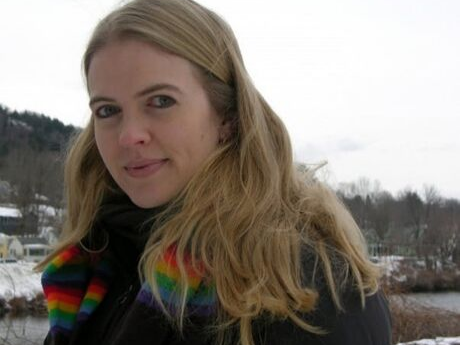New American Poets
New American Poets: Oni Buchanan

Like a Near Fold
In the courtyard, a matted
chunk of feathers
lies on the walkway,
some membrane
tethering a few
unkempt shafts.
The burgeoning generators
billow their vaporous heave
while the drainage system
mingles old rains,
coins in a pewter jar.
For there were those we did not see nor did we hear
but felt, as soundlessly they passed behind,
close as an exhale and with the tall swaying of grasses
For the skin so delicate, as petals,
that through the white, a glowing rose up,
a blue net surfacing
from where from where
or from how much deeper
than beneath, than the fathoms
of an eye, that the needlepoint pierced
from below, that the skin stretched
on its scaffolding of bones
lets the prick pass, steady, a thrust
from the fifth chamber of the heart
For it comes as carrying an abacus of teeth
beneath the flap of its satchel,
capped in gold, the strung enamel rattling
For it seeps as if nectar sang words,
the wax in melted mounds of color
For the patterned scraps of fabric
stacked on a tack, ripped from source,
its single threads loosening
at the bounds
For from without, the warmth
a velour at times, a liquid
shroud for the body—
that like a nearer skin, one
(too tired or cold, too cold)
may turn toward
that it envelop, enfold,
a smooth
entry like a pleat in air, there
all the while, patient
to clasp, like a last
lover, sweet
in its wait, soft,
most of all soft—
All rights reserved. Reprinted with the permission of the author.
I don't really have ideas about how this work influenced my own, but the first poem that I really loved--which is not even presented as a "poem," strictly speaking, but as a series of illustrated lines—is Edward Gorey's "The Object-Lesson." I discovered this poem during middle school, immediately memorized it, and ritually recited it every Thursday well into my first year of college. The poem itself is dark with simultaneously hilarious and incredibly sinister insinuation. All of its major actions occur elsewhere than the poem, and inexplicable scenario are linked only by tone and by a vast, bleak landscape through which unrelated personages wend their ways. Intersections between lives of the different surfacing and ever-changing protagonists are not connected by anything more than a panoramic attention which sweeps only once over the barren land, observing its occupants only long enough to name actions without history and without conclusion before the frame of attention moves on. The tantalizing presentation of all these "doors"—the deep stories behind every object, person, and locale in the poem—and Gorey's steadfast refusal to throw the doors wide with explanation and backstory, I found marvelous. It was my earliest experience of how selectively withheld information combined with selectively presented details (and the placement of those details in the poem, the manner in which they surface, the timing of their appearance, their endurance, their disappearance) endowed objects, people, landscapes with a kind of radiant shifting, mutability, and depth which made them real and unknown in the way that real things are unknown and able to be tapped for the most alien of revelations.


